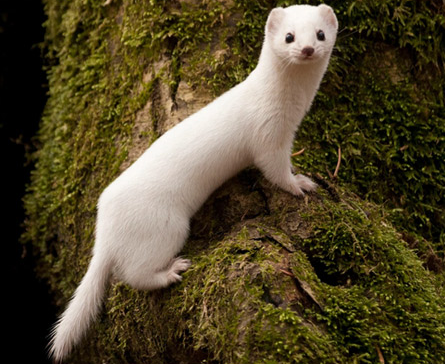(单词翻译:单击)
White-furred animals are in danger of dying out because climate change is causing a fall in snow cover, leaving them exposed and vulnerable, a new study suggests.
一项新研究指出,白毛动物正面临灭绝的危险,因为气候变化导致冰雪覆盖范围减少,从而让白毛动物难以藏身、易受攻击。
Scientists in Poland have been following the worrying case of the white-coated weasel, which sheds its tawny covering in the winter for a milky coat allowing it to blend effortlessly into its icy environment.
波兰的科学家们一直在跟踪调查白鼬这种令人担忧的状况。白鼬在冬天会褪去黄褐色的皮毛,长出雪白皮毛,以便轻松地融入冰雪环境中。
But researchers have discovered that between 1997 and 2007 the number of days with permanent snow cover in Białowieża Forest, Poland, halved, from 80 to 40.
但是研究人员发现,1997年至2007年间,波兰比亚沃维耶扎原始森林被长期冰雪覆盖的时间从80天缩短到了40天。
It means that the little creatures are being caught out in a completely unsuitable environment, where they are easy prey for predators like foxes and crows.
这意味着这种小动物将和环境格格不入,容易成为狐狸和乌鸦等捕食者的猎物。
The team at the Polish Academy of Sciences found that on days when there was little winter snow cover, the number of white-coated weasels they managed to capture fell to as low as 20 percent of the total, suggesting the rest had been killed.
波兰科学院的研究团队发现,在冰雪覆盖范围很小的日子里,他们能捕捉到的白鼬的数量下降到了猎物总数的20%,这意味着另外那部分白鼬都已被杀死。
Previously they would have been dominant, because their coats would have given them a survival advantage.
先前捕获的猎物基本都是白鼬,因为它们的白毛给自己带来了生存优势。
The problem is likely to affect other white-furred mammals and birds living in areas vulnerable to climate change such as the Arctic fox as the snow cover increasingly gives way to a landscape of greens and browns.
在一些容易受气候变化影响的地区,那里的其他白毛哺乳动物和鸟类很可能也被这个问题困扰,比如北极狐,因为越来越多本应被冰雪覆盖的地方露出了绿草和黄土地。
Scientists have recorded 21 mammal and bird species which turn white in the winter to hide themselves in snowy landscapes including the mountain hare, the Siberian hamster, the collared lemming, the white-tailed jackrabbit and the willow ptarmigan bird.
科学家记录了皮毛会在冬天变白以在冰天雪地里藏身的21种哺乳动物和鸟类,包括雪兔、西伯利亚仓鼠、环颈旅鼠、白尾长耳大野兔和柳雷鸟。

Author Dr Karol Zub, told The Telegraph: "Definitely the same rules apply to all seasonally moulting mammals and birds."
研究报告的作者卡罗尔·祖布博士告诉《每日电讯报》说:“同样的规律肯定适用于所有季节性换毛的哺乳动物和鸟类。”
"According to studies on showshoe hares during periods when hares are colour mismatched weekly survival probability decreases by 3.3 - 6.5 percent. This seems not to be a big effect, but the cumulative effect over winter can seriously influence mortality of the species."
“根据对白靴兔的研究,当白靴兔的颜色不能融入环境时,它们单周的生存几率下降了3.3%-6.5%。这听起来似乎影响不大,但是整个冬天的累积效应将会严重影响这类物种的生存。”
"It is very probable that in the near future white weasels and stoats will disappear completely from many areas of Northern Europe and North America. They will either be replaced by brown morphs or they will evolve and moult later in the season, being only partly white for a relatively short period."
“在不远的未来,北欧和北美许多地区的白鼬很可能将完全消失。它们要么被棕色的变种鼬取代,要么进化成更晚换毛、白毛期相对更短的白鼬,而且在白毛期时,身上也只有部分白毛。”
Researchers also carried out tests using toys of brown and white-coated weasels to see if the colours were actually making a difference to predators.
研究人员还用黄鼬和白鼬玩具做了测试,看颜色是否对捕食者有影响。
When they set up camera traps they found dozens of animals, such as foxes, wolves and birds of prey had approached the white toys, but none had shown interest in the brown versions.
研究人员布好相机陷阱后,他们发现狐狸、狼和食肉鸟等数十种动物都接近过白色玩具,但没有动物对棕色玩具表现出兴趣。
The authors say both findings suggest that the decrease in white-coated weasels is due to an increase in detection by predators in a less snowy environment.
作者称,这两项研究都表明,白鼬数量下降缘于在冰雪覆盖减少的环境中捕食者更容易发觉白鼬的存在。
The researchers are hopeful the animals will learn to adapt, but say they cannot rule out the animals vanishing entirely.
研究人员希望白鼬能学会适应环境,但也指出不能排除这种动物就此灭绝的可能性。
Weasels that do not change colour in the winter, are more likely to survive to pass on their brown-coated genes, increasing the numbers of the darker species.
那些在冬天不会变色的鼬鼠更可能生存下去,进而把褐毛基因传递给下一代,导致黄鼬数量增加。
Dr Zub added: "We should not underestimate the power of natural selection. We hope that along with future climate warming, autumn temperatures will also increase, providing an additional signal to the weasels to delay their moult."
祖布博士补充道:“我们不应低估自然选择的力量。我们希望在未来气候变暖的过程中,秋季气温也会随之升高,能够向鼬鼠额外传递延迟换毛的信号。”


